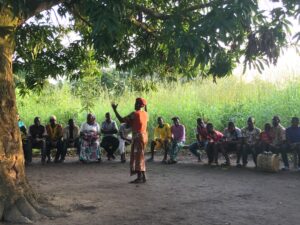
Story group in West Africa
What makes a good oral Bible story? There are many ministries that develop oral Bible stories, and they have varying approaches on the process of developing an abbreviated and simplified story from a biblical passage(s).
Good story development follows four principles embraced by many in the story community of biblically faithful to the textual Bible passage(s), orally reproducible (meaning that that story can be easily learned and told by others), naturally told and the story is appropriate to the culture, often expressed in the use of key terms understood by the local community. In addition, a good oral Bible story based on a Bible passage(s) has a plot or story line that keeps the listener interested and engaged. The actual storyteller can also influence the quality of the story experience to the listener
When developing an oral Bible story, a ministry may embrace common elements practiced by other story practitioners (e.g., testing the story with those who don’t follow Jesus) while having nuances (e.g., use of technology) in the story development process that is unique to the ministry.
So what makes a good oral Bible story? Two important aspects are fidelity to an established process and people embracing the story.
Story Development Process
Developing a good oral Bible story into another language intersects with many cultural, sociological, theological and linguistic considerations. Oral Bible story developers employ tools in varying degrees to leverage those considerations in their story development process or methodology.
Adherence to an agreed upon story development process makes the outcome a good oral Bible story. This assumes that the story practitioner has confidence in the process of story development. If the process is good and the people developing the story faithfully followed the process, then we can assume the story is good. Many story development practitioners have processes that have their roots in a common story development process including testing, focus groups, comparison to scriptural text, scriptural resources, technology, culturally appropriate forms of artistic expression (e.g. drama), back translation and outside consulting. While practitioners may share these common processes, they also apply their own nuances to them such as the time spent in a particular process.
While a process itself is subjective to each ministry, the execution of developing a story using a process is objective. The key to developing a good oral Bible story is fidelity to their process. A story practitioner can objectively determine whether or not they followed their process. If the practitioner omits or takes shortcuts on a given element in the process then there is likely reason to question whether the story is good than if they adhered entirely to their process. They consider the completed story a good story because they followed their process and they are confident that process generates a good story.
Storytelling Community
The second perspective focuses on the storytelling community, and this has two elements. First, if the local Christians embrace the story as having fidelity to God’s Word and they are willing to share the story with others as the Word of God in a story format, then the story is good. This first element assumes the local Christians know and understand God’s Word and embrace common orthodoxy Christian beliefs as expressed in a statement of basic Christian beliefs such as the Nicene Creed. Secondly, a story is a good story if people hearing the story experience life change by coming to faith in Christ and becoming followers of Christ adhering to a common orthodoxy of Christian beliefs. These two elements are objective because we can observe if people use the stories, if people accept the story as faithful to God’s Word and if people become followers of Christ.
Summary
Developing a good oral Bible story includes many cultural, sociological, theological and linguistic considerations. Oral Bible story developers employ tools in varying degrees to leverage those considerations in their story development process. A good story includes fidelity to common story development practices. In addition, a good story has the acceptance of the Christian community. Most importantly, a good story results in new followers of Christ that embrace commonly held Christian beliefs. These are the marks of a good oral Bible story.
Mark Steinbach
Director, StoryRunners
100 Lake Hart Drive, MC 1100
Orlando, FL 32832-0100
407.826.2310 office
407.453.1033 cell
Mark.Steinbach@cru.org